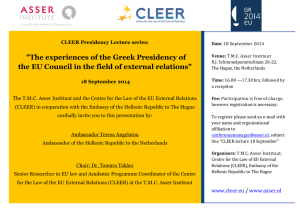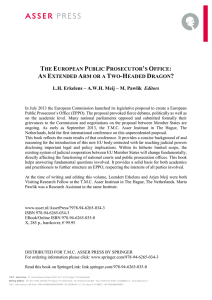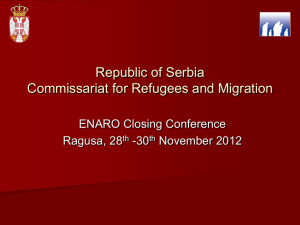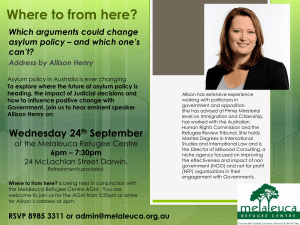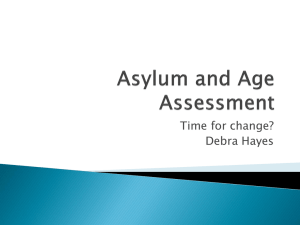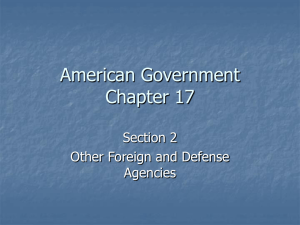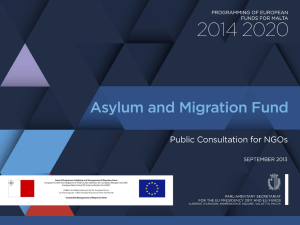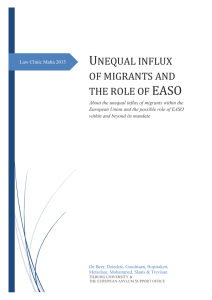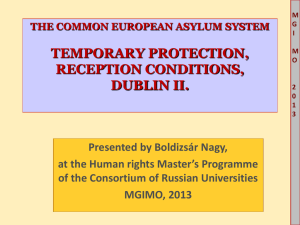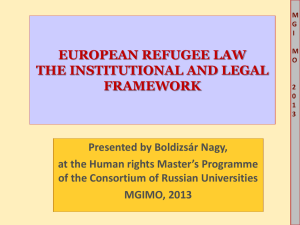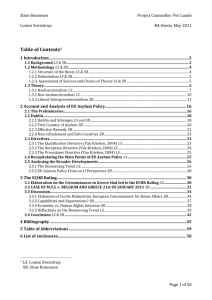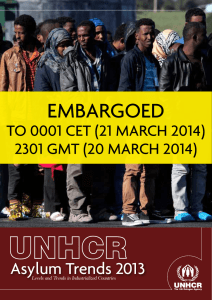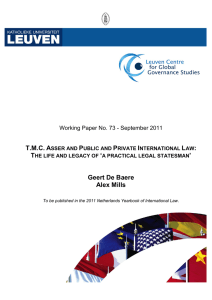Using Human Security as a legal framework to analyse the Common
advertisement
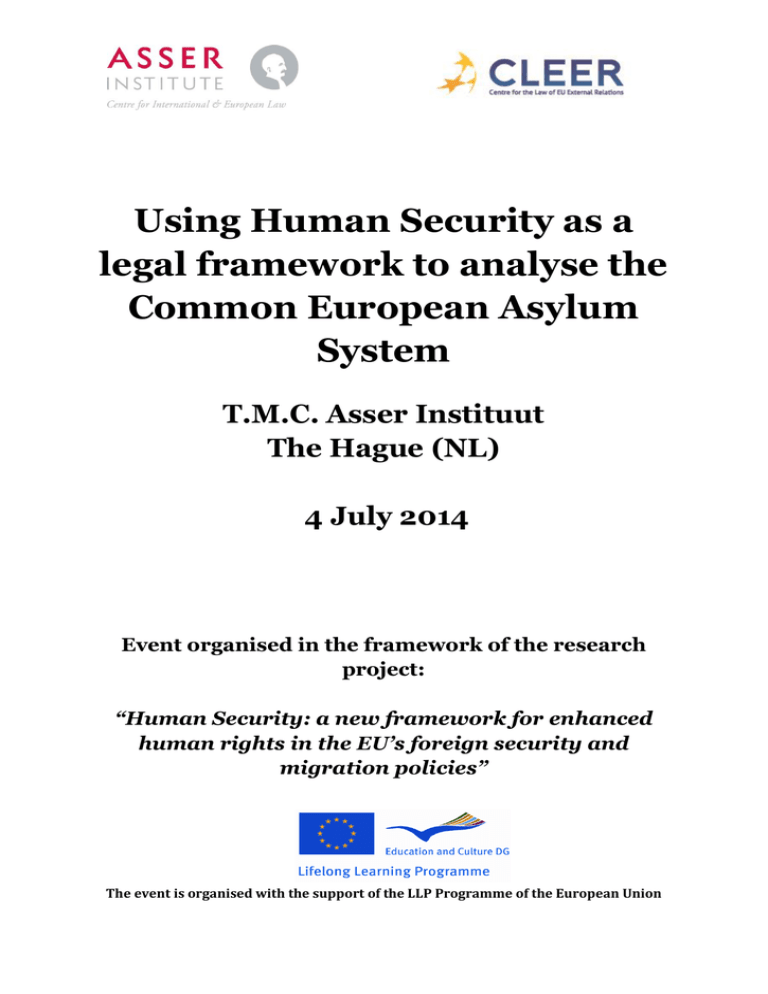
Using Human Security as a legal framework to analyse the Common European Asylum System T.M.C. Asser Instituut The Hague (NL) 4 July 2014 Event organised in the framework of the research project: “Human Security: a new framework for enhanced human rights in the EU’s foreign security and migration policies” The event is organised with the support of the LLP Programme of the European Union Human Security: a new framework for enhanced human rights in the EU’s foreign security and migration policies Using Human Security as a legal framework to analyse the Common European Asylum System The conference is the second event falling within the current CLEER research project titled “Human Security as a new operational framework for enhancing Human Rights protection in the EU’s Security & Migration Policies”. The second conference will expand on the focus of the previous event to address a specific ambit in which human rights, EU security and foreign policy meet: EU asylum and migration policy. The conference will address the role that Human Security can play in relation to the legal and political toolbox with which the EU responds to humanitarian crises such as conflicts and natural disasters. It shall take stock of recent developments in EU legislation, jurisprudence and doctrine whilst analysing the extent to which Human Security discourses can enrich protection standards within the Common European Asylum System (CEAS). A comprehensive shift in current discourse is needed and very much overdue. Despite recent trends in jurisprudence from the European Court of Justice, which advocate a wider interpretation of who is entitled to protection under the CEAS, (C-199/12- C-201/12 X,Y,Z v Minister voor Immigratie en Asiel and C-285/12 Diakité) there are still glaring deficiencies in Member States protection schemes which could undermine the current developments in asylum case law. With the Stockholm Programme soon to be replaced by a new programmatic document on the Area of Freedom, Security and Justice and the CEAS, the conference provides the right opportunity to take stock of the past challenges and look ahead. At the same time, while the concept of Human Security has been thoroughly used by political scientists to assess the relationship between individual rights and freedoms with current security threats such as terrorism and state failure, the concept has not yet been used to assess and analyse the EU acquis on asylum, subsidiary protection and border control. The conference is divided into three general parts and a special one. The first part of the conference (i) will look at the extent to which Human Security should or could be integrated into the interpretation of existing international and European norms. Particular attention will be paid to both recent applications of the Qualification Directive by the Court of Justice of the EU and the EU’s policy programmes in the area of Freedom, Security and Justice; (ii) secondly, the conference will explore the possible legal implications of using a Human Security paradigm to assess the Dublin II Regulation and border control operations; (iii) thirdly, the conference will look at the substantive content of rights that those seeking protection are entitled to and the extent to which Human Security can be used to ensure a coherent and consistent application of EU norms within the Member States. Moreover, the last session (iv) will address a case analysis on the migration-security nexus related to the recent political unrests affecting the EU’s Southern- Mediterranean neighbours. CONFERENCE PROGRAMME 9:45–10:00 Welcome and registration 10:00–10:10 Opening of the conference and introduction to the research project “Human Security as a new operational framework for enhancing Human Rights protection in the EU’s Security & Migration Policies” by Dr. Tamara Takács, Academic Programme Coordinator of CLEER and Senior Researcher on EU Law at the T.M.C. Asser Instituut, The Hague 10:10–11:15 Session 1 Moderator: Dr. Tamara Takács, CLEER/T.M.C. Asser Instituut Responding to contemporary emergencies with a Human Security approach: the case of the Common European Asylum System. 10:10-10:25 1. Introductory remarks, Claudio Matera, Researcher, T.M.C. Asser Instituut 2. Key Note Speech Bringing Human Rights to the centre of the EU’s asylum policies: lessons learned and ideas for the future, Myrthe Wijnkoop, Dutch Council for Refugees (confirmed) 10:25-10:55 (10: 55– 11:15 Discussion, Q&A) 11:15–11:30 COFFEE BREAK 11:30–13: 00 Session 2 Moderator: Dr. Seline Trevisanut, Utrecht University (confirmed) Assessing the operational framework of the CEAS: rights protection at a crossroads with internal security interests. 1. Access to protection under EU law: what role for human rights and Human Security in the implementation of the Dublin system? Dr. Violeta Moreno-Lax, Queen Mary University, London (confirmed) 2. Operational aspects of EU external border management: what role for Human Security considerations? Dr. Jorrit Rijpma, Leiden University (confirmed) (12:30 - 13:00 Discussion, Q&A) 13:00–14:00 LUNCH 14:00–15:15 Session 3 Moderator: (TBC) Taking stock of protection rights in the Common European Asylum System: the added value of a Human Security approach. 1. The role of EASO in the implementation of the CEAS: what space for Human Security? Dr. Robert K. Visser, EASO, (confirmed) 2. Protection standards in the CEAS: Human Rights obligations and Human Security interests in the reception conditions for asylum seekers, Dr. Lieneke Slingenberg, Assistant Professor VU University Amsterdam (confirmed) (14.45 - 15:15 Discussion, Q&A) 15:15 -15:30 Coffee Break 15:30–17.00 Session 4 Moderator: Claudio Matera, Researcher, T.M.C. Asser Instituut What prospects for migration-security nexus in the Southern Mediterranean relations? 1. Ten Years Humanitarianism in the Strait of Sicily. From “Cap Anamur” to “Mare Nostrum,” Dr. P. Cuttitta, Researcher VU University Amsterdam (confirmed) 2. The initiatives of EU Member States in managing asylum seekers in the South Mediterranean, Dr. Paula Garcia Andrade, Universidad Pontificia Comillas (confirmed) (16.30- 17.05 Discussion, Q&A) Concluding remarks and reception
